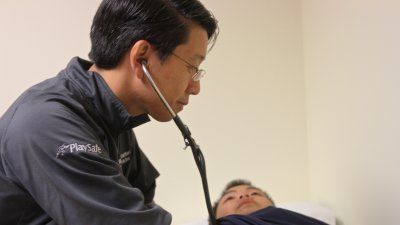University of California San Francisco
Give to UCSF-
-
Big Contrast in Hospitals' Medicare Billing
-
California Weighs Expanded Role For Nurse Practitioners
-
Genetic Test Helps Predict Risk of Prostate Cancer Recurrence
A genetic test that measures cell cycle progression — an indicator of how rapidly cancer cells are growing and dividing — can be a useful tool for predicting who will have a recurrence of prostate cancer, according to researchers at UCSF.

-
Free Health Screening Gives High School Athletes Peace of Mind
Lowell High School football player Jacky Tang went through a barrage of medical tests at UCSF’s PlaySafe Cardiac Physicals, an interdisciplinary clinic designed to detect underlying medical abnormalities in young athletes and prevent sudden death.
-
Harvard Stem Cell Researchers Find Protein that Rejuvenates Aging Mouse Hearts
-
Cell Therapy Promise Highlighted at UCSF Symposium
UCSF recently convened experts to discuss cell therapies, which have already saved children and adults from leukemia in clinical trials after other drugs failed them.
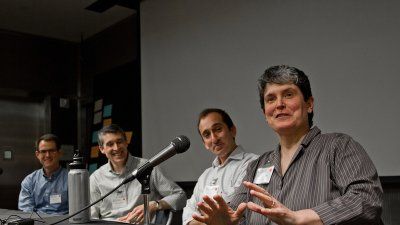
-
Genetic Test Helps Identify Aggressive Prostate Cancer
-
Prostate Test Could Cut Need For Surgery
-
Gene Test May Help Guide Prostate Cancer Treatment
-
New Test Improves Assessment of Prostate Cancer Risk, Study Says
-
New Prostate Cancer Test Improves Risk Assessment
A new genomic test can help predict whether men are more likely to harbor an aggressive form of prostate cancer, according to a new UCSF study.
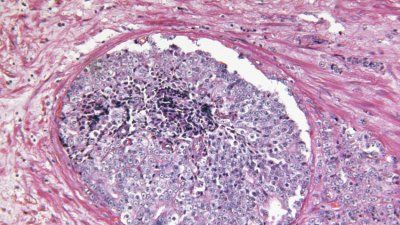
-
Hospital Prices Diverge Wildly, U.S. Data Show
-
Imaging Technique Could Help Traumatic Brain Injury Patients
A new application of an existing medical imaging technology could help predict long-term damage in patients with traumatic brain injury, according to a recent UCSF study.
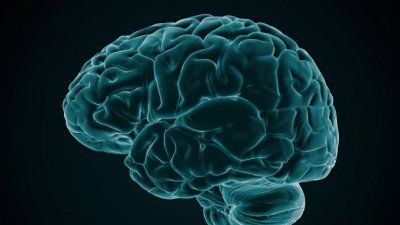
-
One Hospital Charges $8,000 — Another, $38,000
-
One-Time Cell Transplantation Cures Epilepsy in Mice
-
Chancellor’s TEDMED Talk Promotes Patient Empowerment
UCSF Chancellor Susan Desmond-Hellmann sees a future in which health care consumers drive treatments and innovation, sharing that vision in a recent TEDMED talk.
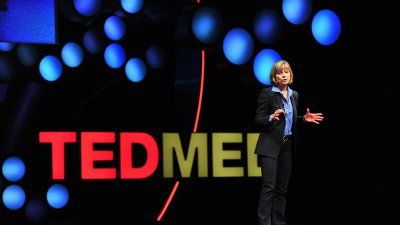
-
New Drug Tested at UCSF May Burn Fat Without Surgery
-
Inside the Robotic Pharmacy
-
Human Brain Cells Developed in Lab, Grow in Mice
A key type of human brain cell developed in the laboratory grows seamlessly when transplanted into the brains of mice, UCSF researchers have found.

-
Epilepsy Cured in Mice Using Brain Cells
Epilepsy that does not respond to drugs can be halted in adult mice by transplanting a specific type of cell into the brain, UCSF researchers have discovered, raising hope that a similar treatment might work in severe forms of human epilepsy.
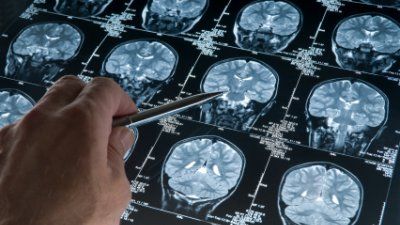
-
Sleep Problems Linked to Increased Prostate Cancer Risk
-
Getting to the Right Relationship Between Doctors and Drug Companies
-
Great Manager Profile: Georgina Lopez
Great Managers must balance a complex array of needs and priorities, people and processes, program goals and financial constraints. It takes a unique blend of talents to do this well. And Georgina Lopez is a natural.

-
Medical Devices Fall Short for Children
-
Marc Benioff, Mark Zuckerberg And Healthcare Movers Gather At UC San Francisco Summit
-
OME 2013 Yields Pilot Proposals to Advance Precision Medicine
Top leaders in government, science, technology, business and academia came together at OME 2013 to not just discuss precision medicine, but develop strategies for making it a reality within the next decade.
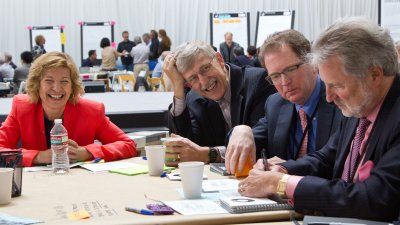
-
Limousine in Deadly Fire Carried an Added Passenger
-
Low-Risk Skin Cancers Often Treated Too Aggressively in Elderly, Study Finds
-
Major Insurance Changes Loom with Affordable Care Act
